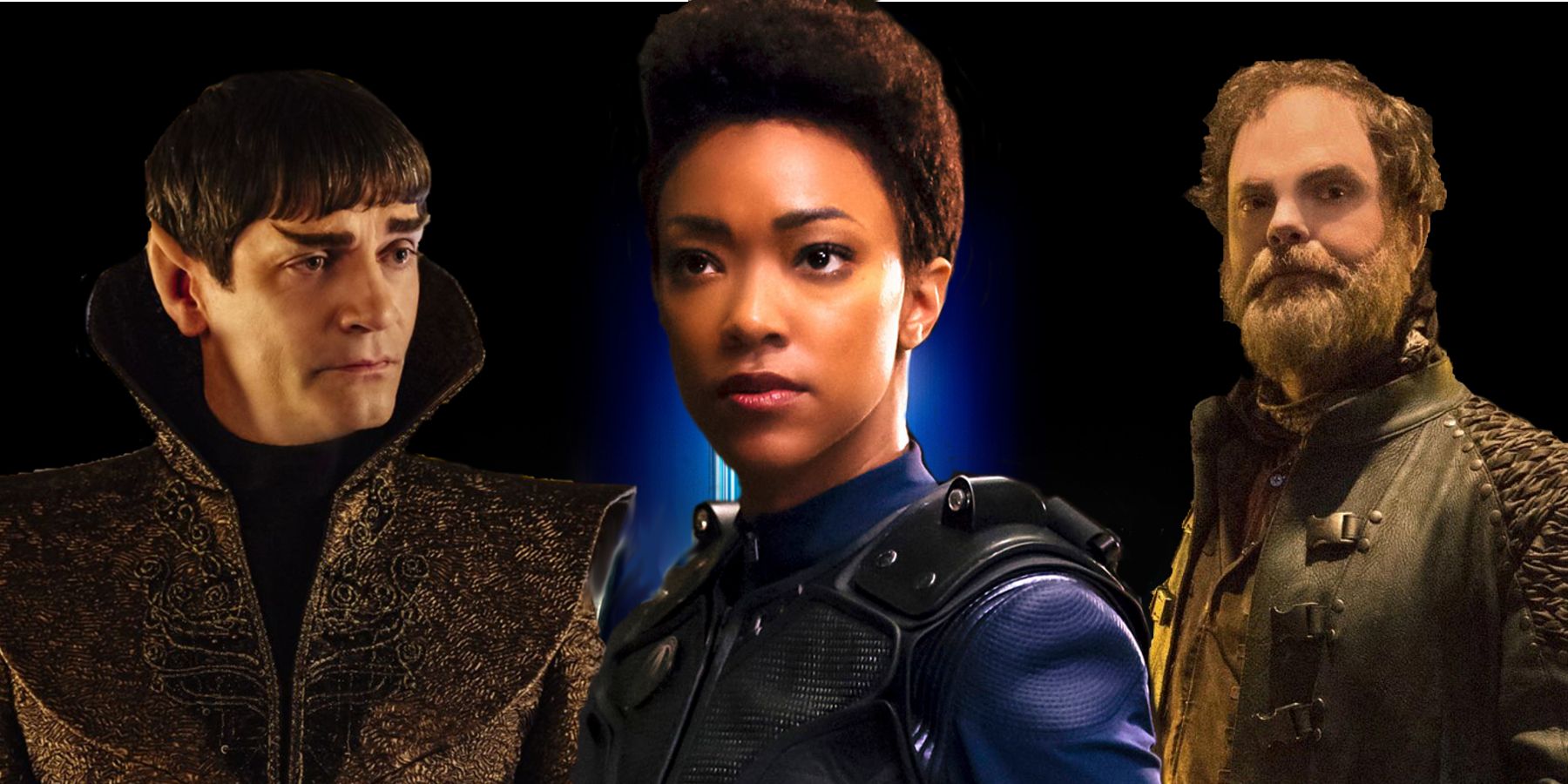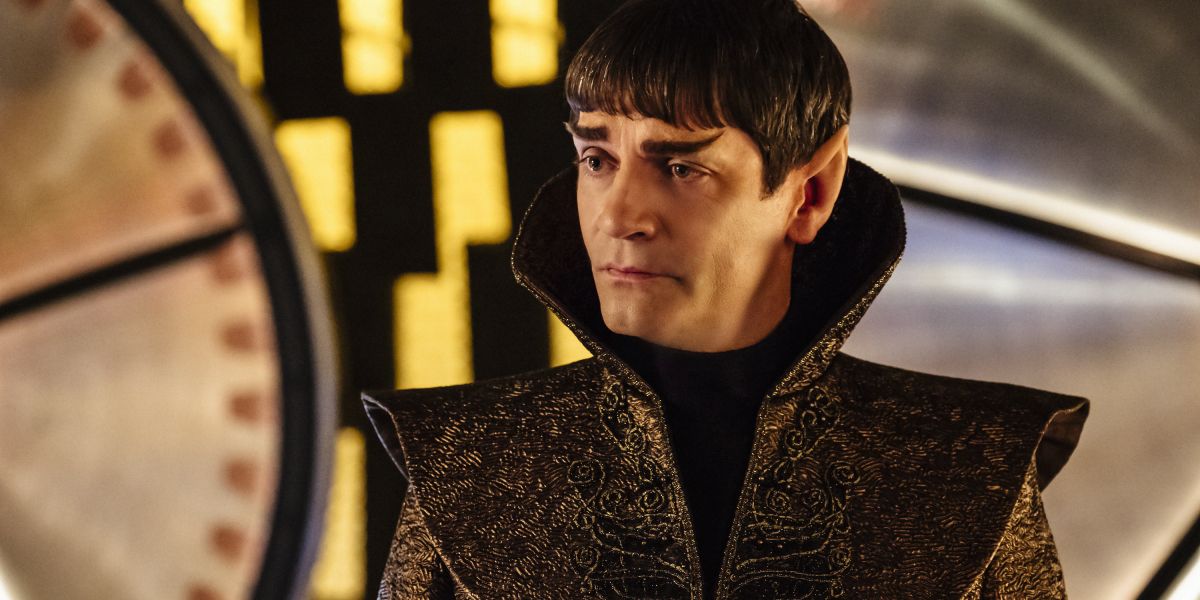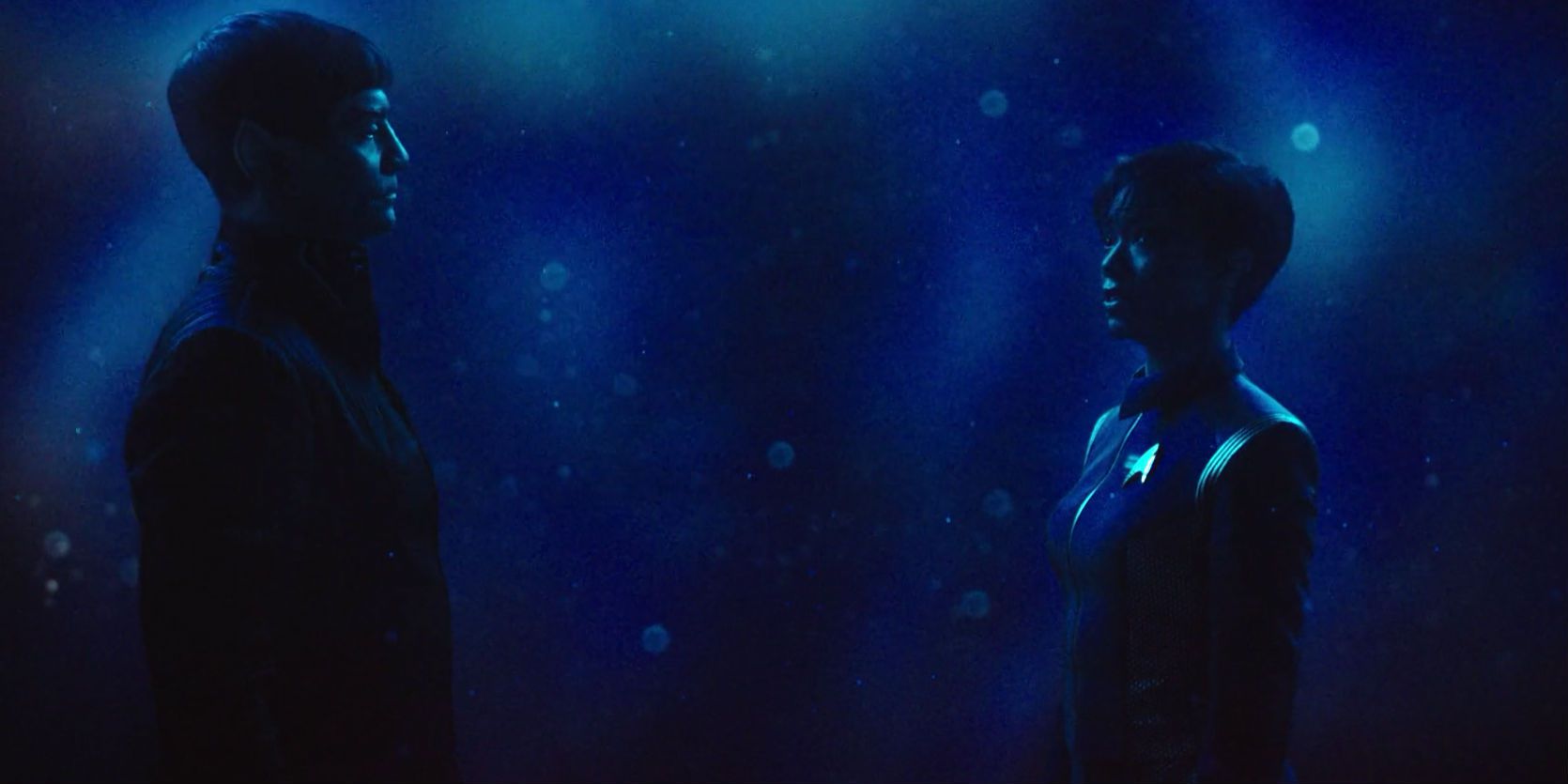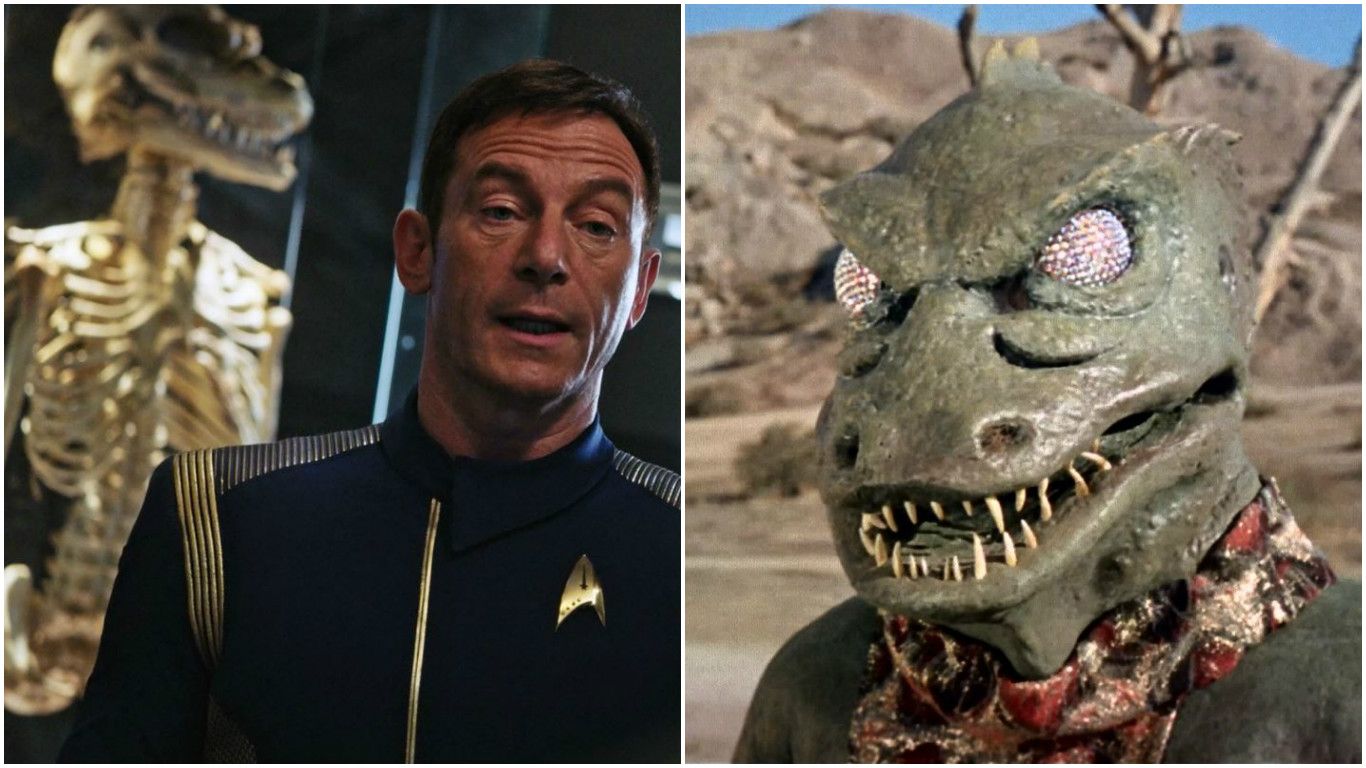Does Star Trek: Discovery have a problem with all its classic references? Many modern versions of classic franchises - in particular, science fiction like Star Wars and Dr. Who - love to slip an array of Easter Eggs and to their own history into their shows, and Discovery went all in. The first half of the season contained fun nods like the bookcase in Captain Georgiou’s ready room on the U.S.S. Shenzhou and major ones like the Federation's early dealings with Harcourt Fenton Mudd.
Fun as they are, has the show spent too much time linking up with its past, even for a series set just before Star Trek: The Original Series? Or, did Discovery find a good balance between fan service and story, allowing audiences to enjoy the show for itself and develop its characters without getting caught up in the minutiae of its own history? Today we're going to take a look at the impact of all these callbacks.
Related: Star Trek: Discovery – The Story So Far
Star Trek Has a Deep Connection to Its Past
The road for Discovery, as a prequel, was always going to be rocky, especially with some fans against it from the onset. Despite some missteps and hiccups (including the Klingon’s hard-to-emote-in new makeup), it's won over much of its core viewership by walking a tricky tightrope between fresh and familiar. Without playing it subtly, though, the show is in danger of being overwhelmed by its callbacks. Some earlier episodes, in particular, were criticised for relying on clunky exposition and pop-ins from iconic figures like Sarek. After all, why would the show include one of Trek's most famous Vulcans, the father of Spock, as Michael Burnham’s adoptive father if not to draw in an audience?
The truth is, Sarek and other more overt references are good ways to draw in fans and curious newcomers familiar with the major players. Any show set between the escapades of Captains Archer and Kirk will require some context to avoid feeling disjointed from its continuity. Including deeper links to the past was smart and necessary, and has been true of all prior Trek shows.
Previous series and films set in the future or the Kelvin timeline also featured numerous direct references and guest appearances, including Nimoy's Spock as a key character in Star Trek (2009) and Into Darkness (2013). The franchise’s first reboot, The Next Generation, even modeled its third episode, “The Naked Now,” directly on the unusual space-intoxicant from the classic TOS episode, “The Naked Time.” TNG also brought Spock and Sarek back for two episodes, as well as original series cast members. The franchise's second spinoff, Deep Space Nine also featured numerous tie-ins to classic lore, even including three of The Original Series' Klingons in a one-off storyline - as did its heirs, Voyager and Enterprise on numerous occasions.
True, some of Discovery’s callbacks, like the Tribble and Gorn skeleton in Captain Lorca’s (Jason Isaacs) super secret science room or one of several Wrath of Khan references, feel like fan service and nothing more. But they do contribute to the overall flavor of the latest offering. Plus, if the writers can spin those connections in meaningful ways, it will only enhance our understanding of those murky, pre-Kirk days. The true measure of its use of callbacks, though, lies in their impact on the feature players and their stories, including several that play key roles in the narrative.
More: Things You Completely Missed In Star Trek Discovery
Does Discovery’s Story Rely Too Much on Callbacks?
No matter how fans feel about its position on the timeline, Discovery is wedged ten years before TOS, and therefore inherently linked to mid-era Trek lore. Therefore, some interaction with the established mythology is inevitable. But did the show’s most sizeable references - Sarek and Harcourt Fenton “Harry” Mudd - work appropriately?
For Mudd, whose inclusion was viewed with a raised Vulcan eyebrow by many fans, his two episodes (so far, anyway) actually gave the character more meat and muscle than his prior appearances (no disrespect to TOS writers or Roger C. Carmel's beloved iteration). Mudd is still his same old mustache-twirling self, with his characteristic flair for the dramatic and underwhelming success rate. However, he’s also become a top-notch foil for the multifaceted Captain Lorca. Discovery has also peered into his background, including introducing a young version of his long-suffering wife, Stella (Katherine Barrell), which rounded out his first arc and explains their strained relationship – after all, he scammed her father and ran off on his new bride. It also explains Mudd's later antagonistic relationship with his 'beloved' Stella, who undercuts him regularly, causing him to leave her behind later, even building an android replica of her to finally get one over on her.
In Sarek’s case, Discovery has actually enriched his backstory while adding new layers to his relationship with Spock and his mother, Amanda Grayson. It also gave fans fresh insight into the iconic Vulcan's background, explaining why his choice to join Starfleet over the Vulcan Expeditionary Group kicked off his feud with Sarek. That he feels shame over denying Michael her opportunity, only for Spock to go against his wishes – thereby negating his logical but painful decision – only makes him more relatable. Most of all, Sarek's personality informs viewers about Michael’s temperament and adds depth and richness to both of their stories.
Most importantly, neither character exists strictly in a referential capacity. Sarek’s relationship to Burnham is vital since he’s her adoptive father. He becomes a key player, not only peeling back layers of her character but also her motivations. Similarly, Mudd’s time on Discovery, which is unlikely at an end, informs his later involvement with Kirk and his crew, as well as his motivations. As a result, these characters aren’t just “hey, look it me” moments but serve the show and its own characters.
Related: Star Trek: Discovery Characters Who Could Be The Mirror Universe’s Emperor
Another significant reference is the use of the U.S.S. Defiant in the mid-season premiere "Despite Yourself." When the crew is transplanted into the Mirror Universe by the spore drive, they realize they're not the first Federation ship to make the journey. That honor belongs to the Defiant, a ship from roughly a decade in future, which featured heavily into the TOS episode, "The Tholian Web." It later acted as the lynchpin for Enterprise's own prequel to the classic episode, "Mirror, Mirror," which originally introduced the alternative reality Kirk and Spock (the one with the beard), "In a Mirror. Darkly." During the episode, the crew discovers that the Defiant was pulled into the Mirror Universe by a wormhole.
Not only is the starship a fun reference to a winding story thread, but may play a key role in the crew's attempts to escape the Mirror Universe – and perhaps even hold the key to Discovery's entrance into the official canon.
Clearly, Discovery isn't shy about sprinkling its Easter eggs around. But, for the most part, they aren't distracting or cloying for the most part. References to key franchise names, dates, and places, such as Constitution-class ships like the Enterprise, Mudd’s Q-like “mon capitaine,” or planets like Khitomer (the site of a Romulan massacre) and the Paulson Nebula (where the Enterprise hides from the Borg in “Best of Both Worlds”) are fun but don’t impact the plot or characters one way or the other. And more significant tie-ins like Sarek or the U.S.S. Defiant have, generally speaking, become vital to the story.
If the show continues to use its references to inform rather than merely as a knowing wink, Discovery will remain an engaging series. However, if it falls prey to dropping eggs for the sake of ratings or fan service, the latest outing runs the risk of becoming too self-aware or even parodic. Hopefully, this informs the writers and produces going into season two.
Next: Could CBS All Access Survive Without Star Trek: Discovery?
The latest Star Trek: Discovery episode, "The Wolf Inside," airs on January 14, 2018.




